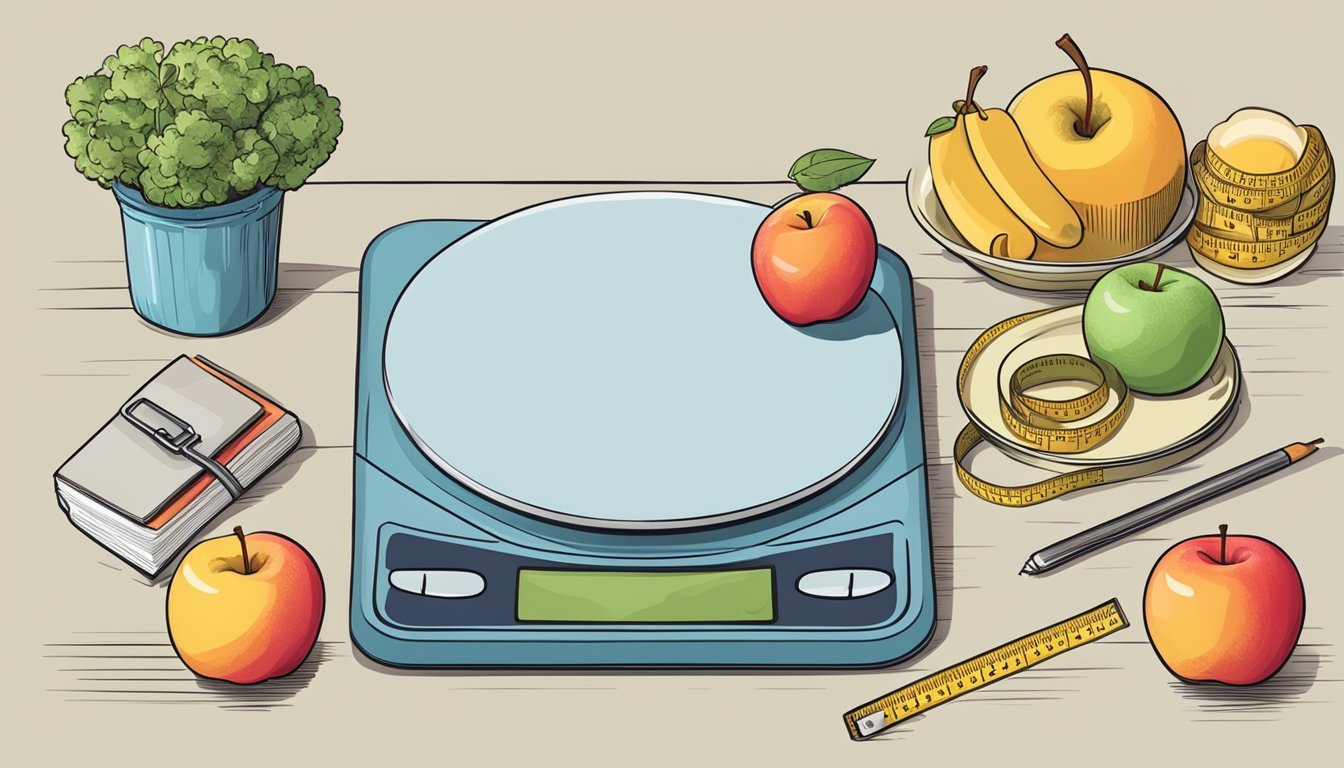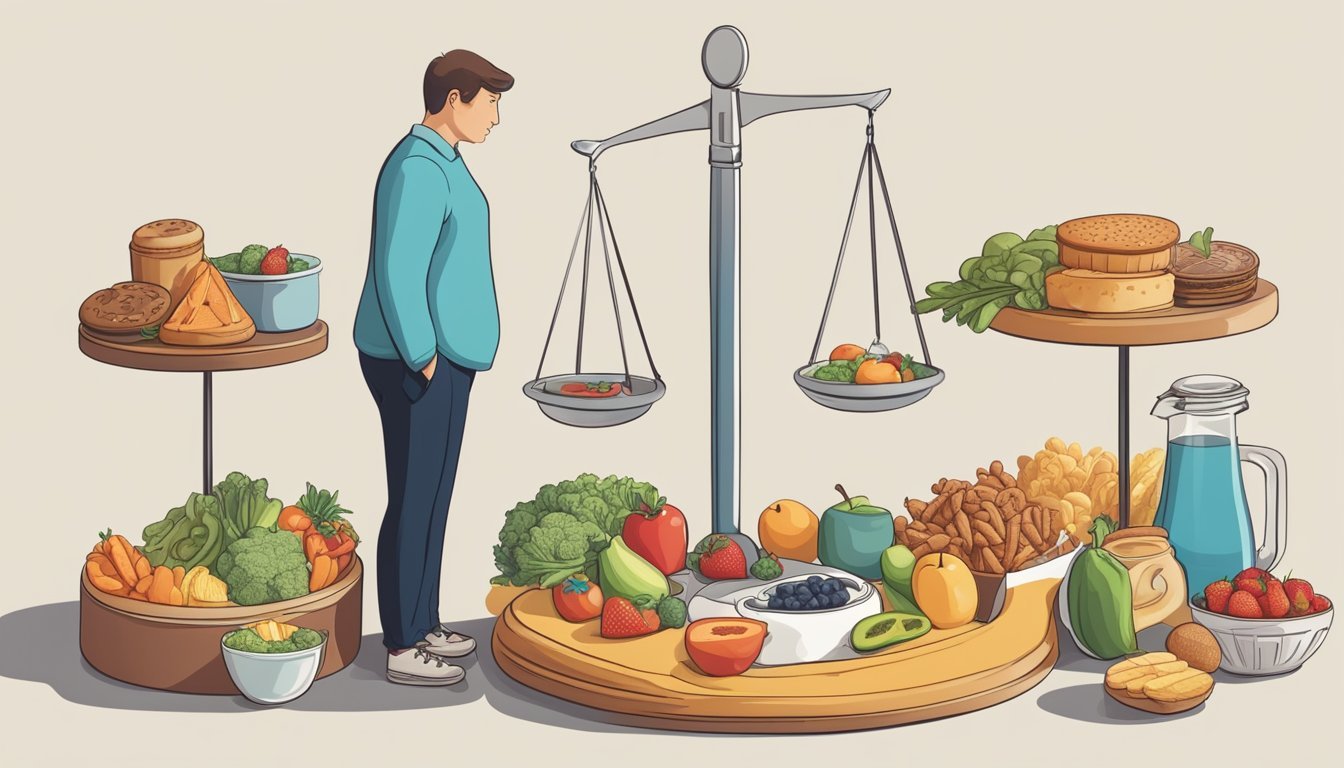The Myth of the Intuitive Eating Approach
Analyzing Its Effectiveness in Weight Loss
Intuitive eating challenges conventional weight loss methodologies by dismissing the traditional dieting paradigm that focuses on restricting certain foods and adhering to stringent eating schedules. At its core, it is a philosophy that promotes a healthier relationship with food, encouraging individuals to listen to their body's hunger signals and eat foods that make them feel good physically and emotionally. Rather than dictating what, when, and how much to eat, intuitive eating is about tuning into the body's own cues and making food choices without experiencing guilt or an obligation to exercise.
While intuitive eating emphasizes a weight-neutral approach, its effectiveness for weight loss is a subject of debate within the health and nutrition community. It aligns with the perspective that health improvements can be made independent of weight loss, concentrating on behavioral changes rather than the scale. However, intuitive eating is not designed as a weight loss program, and any weight changes that occur may be incidental to its principal aim of enhancing one's relationship with food and overall well-being.
Studies have explored the connection between intuitive eating and health outcomes, suggesting potential benefits such as lower instances of disordered eating, improved metabolic markers, and greater emotional well-being. It's essential to consider these broader health indicators alongside the pursuit of weight loss, recognizing that while intuitive eating might not be a direct route to weight loss, it may offer a sustainable and holistic approach to health that moves beyond the narrow focus on weight as the primary measure of health.
The Fundamentals of Intuitive Eating
Intuitive eating is a non-diet approach focusing on internal body cues instead of external eating rules. It prioritizes psychological well-being overweight control.
Defining Intuitive Eating
Intuitive Eating (IE) is an approach that encourages individuals to listen to and honor their internal body cues—such as hunger and fullness—over strict diet regimens or external food rules. Unlike traditional dieting, which can involve calorie counting and restrictive meal planning, IE promotes a more natural and personal relationship with food and eating.
Evelyn Tribole and Elyse Resch's Principles
Developed by registered dietitians Evelyn Tribole and Elyse Resch, Intuitive Eating is based on 10 fundamental principles. These guidelines aim to cultivate a harmonious relationship with food and body image. They include:
Rejecting the diet mentality
Honoring your hunger
Making peace with food
Challenging the food police
Discovering the satisfaction factor
Feeling your fullness
Coping with your emotions without using food
Respecting your body
Exercise—feeling the difference
Honoring your health with gentle nutrition
Understanding Hunger and Fullness Cues
IE encourages individuals to tune into their hunger cues and fullness signals, which can help in regulating eating patterns without the need for externally imposed rules.
Hunger cues: Signals that the body needs energy, which can manifest as stomach growling, weakness, or irritability.
Fullness cues: Sensations that indicate satiety, such as a comfortably full stomach, a decrease in hunger, or feeling content.
People practicing intuitive eating learn to identify and trust these body cues, using them to determine when to eat and when they've had enough.
The Psychological Perspective
The psychological perspective on intuitive eating focuses on the internal experiences related to dieting, self-perception, and emotional regulation. This approach eschews strict dieting in favor of listening to the body's hunger cues and promotes a healthy mindset towards food and body image.
Rejecting the Diet Mentality
Intuitive eating begins with the decision to reject the diet mentality. This entails a conscious effort to avoid restrictive dieting and the belief that certain foods are inherently "good" or "bad." By doing so, individuals may experience less anxiety surrounding food and eating, as the pressure to control every aspect of their diet diminishes. The Harvard T.H. Chan School of Public Health discusses how intuitive eating allows one to make food choices guided by internal cues rather than strict rules, suggesting it may alleviate negative mental health effects caused by traditional diets.
Impact on Self-Esteem and Body Image
The practice of intuitive eating is often linked with improvements in self-esteem and body image. It encourages an acceptance of one's body and the rejection of unrealistic body standards perpetuated by society, fostering a body-positive attitude. A key component of this is learning to appreciate the body's needs and signals, rather than submitting to external judgments or the pursuit of an idealized body shape, which can contribute to disordered eating patterns.
Dealing with Emotional Eating
Intuitive eating also addresses emotional eating by acknowledging the role of emotions in food choices. Instead of using food as a primary response to emotions, individuals are encouraged to develop a healthier relationship with food, where eating serves as one of many coping mechanisms, thus reducing guilt and negative feelings associated with eating for emotional reasons. It suggests that understanding and differentiating between physical hunger and emotional needs can lead to more mindful eating habits, contributing positively to one's mental health.
Physical Health and Nutrition
In the context of intuitive eating, considering physical health and nutritional adequacy is crucial. This section examines the vital components of nutrition, how they relate to health, and how they fit within the intuitive eating framework.
Understanding Nutritional Needs
It is essential to recognize that each individual's body has unique nutritional requirements. These requirements depend on various factors including activity level, age, sex, and overall health. Macro-nutrients such as carbohydrates, proteins, and fats provide the energy necessary for bodily functions. Meanwhile, micro-nutrients, including vitamins and minerals, support the body's processes.
Carbohydrates: They are the body's primary energy source, and should come from complex sources such as whole grains, fruits, and vegetables.
Protein: Vital for repair and growth of tissues; sources include lean meats, legumes, and dairy products.
Fats: Necessary for energy, absorption of certain vitamins, and cellular health; sources should include healthy fats, like those from nuts, avocados, and olive oil.
Cholesterol, Fat, and Energy Balance
Cholesterol and fat are often viewed negatively due to their associations with heart disease and weight gain. However, they are essential components of a healthy diet when chosen correctly and consumed in moderation.
Cholesterol: Vital for producing hormones and vitamin D; sources include eggs, shellfish, and lean meats. The balance between low-density lipoprotein (LDL) and high-density lipoprotein (HDL) cholesterol is key to cardiovascular health.
Fat: Saturated fats should be limited, while unsaturated fats, found in fish, nuts, and seeds, are considered more heart-healthy.
Energy Balance: Maintaining a balance between energy intake through food and energy expended through physical activity is fundamental for weight management.
Gentle Nutrition and Healthier Choices
Gentle nutrition encourages making food choices that honor health but without strict adherence to rigid diet rules. This aspect of intuitive eating supports physical health by promoting food selections that improve health and well-being.
Fruits and Vegetables: High in fiber, vitamins, and minerals; linked to numerous health benefits.
Whole Grains: Provide sustained energy and help maintain a healthy digestive system.
Lean Proteins: Important for muscle maintenance; includes choices like poultry, fish, and plant-based alternatives.
Healthy Fats: Contribute to satiety and support nutrient absorption; sources such as avocados, nuts, and seeds are encouraged.
This approach to nutrition advocates for a balanced diet that includes a wide variety of foods, allowing individuals to make peace with food and avoid the negative outcomes associated with restrictive diet culture.
Weight Loss, Diet Culture, and Health Conditions
The intersection of weight loss methodologies, pervasive diet culture, and the management of health conditions is complex. This section explores the role of intuitive eating in weight reduction, its challenge to traditional body size aesthetics, and implications for those with medical conditions.
Can Intuitive Eating Lead to Weight Loss?
Intuitive Eating (IE) operates on the premise that the body has the innate ability to regulate food intake without restrictive diets. While IE is not designed as a weight loss program, it may lead to a healthy weight for some by promoting body attunement and discouraging habitual overeating. Studies imply that individuals who adopt IE might maintain or lose weight indirectly, but its efficacy varies from person to person, and it is not a weight-loss guarantee.
Challenging Societal Norms around Body Size
IE inherently confronts the prevailing diet culture, which often glorifies thinness and a low BMI. By focusing on internal cues rather than external diet rules, IE encourages a healthier relationship with food and one's body. It emphasizes nutritional well-being over body size, promoting a paradigm shift away from the conventional metrics of body image and dietitians often advocate for this approach to mitigate the pressure of societal standards.
Intuitive Eating with Medical Conditions
For individuals with specific health conditions, such as diabetes or high blood pressure, IE can coexist with medical advice to create a sustainable eating behavior that supports health management. This non-diet approach aids in developing a long-term strategy for managing conditions without the psychological strain of restrictive diets. However, it is crucial to collaborate with healthcare providers to ensure that IE aligns with the treatment for these conditions, optimizing both physical and mental health outcomes.
Intuitive Eating Practices and Exercise
Intuitive Eating encourages incorporating exercise as a form of self-care rather than as a means to an end for weight loss. It shifts the focus from exercising for weight loss to finding enjoyable forms of physical activity.
Integrating Movement for Pleasure
Intuitive eating positions movement as an essential practice, one that should stem from joy and respect for one's body. Individuals are encouraged to explore various forms of exercise that they find enjoyable, rather than enduring strenuous workouts solely for calorie burning. For example, one might:
Take a dance class for the sheer joy of dancing
Engage in a team sport for the social and fun aspect
Opt for a nature hike to appreciate the outdoors
Coping Strategies Beyond Food
Food often serves as a primary coping mechanism for emotions; however, intuitive eating suggests identifying alternative strategies. These might include:
Physical activity, such as yoga or stretching, to manage stress
Engaging in hobbies that promote self-care and well-being
Regularly practicing meditation or deep-breathing exercises
Creating Lasting Healthy Habits
In the context of intuitive eating, one should approach nutrition and exercise as components of overall health, not just weight management tools. Consider these principles:
Honor your health with gentle nutrition: Choose foods that nourish and satisfy while also enjoying all foods in moderation.
Recognize the value of consistent, moderate physical activity for its health benefits.
Listen to and trust the body's signals for hunger, fullness, and the need for movement.
Combatting External Influences
Intuitive eating challenges the traditional diet mentality by placing focus on internal body cues for hunger and fullness rather than external food rules. This approach seeks to build a healthy relationship with food that is free from guilt and body respect.
Media and Social Pressures
Media and social platforms significantly shape diet culture, often promoting unrealistic body standards and chronic dieting. They drive a diet mentality that can lead to feelings of guilt and failure in individuals. It's important for individuals to critically assess and limit exposure to such triggers on social media and other platforms, which commonly perpetuate a cycle of restrictive eating behaviors and body dissatisfaction.
Common media-driven pressures include:
Idealized body images
Promotion of fad diets
Endorsement of weight loss products
Intuitive eating encourages a departure from these influences, advocating for an appreciation of the body's natural diversity and a rejection of guilt-inducing messages.
Professional Guidance and Support
Consulting with healthcare professionals, such as dietitians or therapists who specialize in eating disorders, can be crucial for those seeking to adopt an intuitive eating approach. These experts can provide personalized support and guidance, helping individuals to navigate past the pressing diet mentality and fostering peace with food.
Experts can assist with:
Recognizing and respecting personal hunger and satiety signals
Understanding and coping with emotional eating
By engaging with professionals who promote body respect and are attuned to the challenges of diet culture, individuals can develop sustainable eating behaviors that are aligned with intuitive eating principles.
Critiques and Considerations
Intuitive Eating (IE) has earned recognition for its non-diet approach, but it also faces scrutiny regarding its effectiveness for weight loss and impact on dietary habits. Critics underscore the need to evaluate its potential drawbacks and address misconceptions within its framework.
Potential Limitations of Intuitive Eating
Intuitive Eating prioritizes internal cues over diet culture's external rules, shifting focus from structured meal plans to an individual's innate hunger and satiety signals. While IE promotes a healthier relationship with food by granting unconditional permission to eat, critics argue that it may not effectively address weight loss as an individual's natural cues may not always align with nutritional balance or caloric needs.
Binge eating is another concern; unlike controlled eating strategies that involve counting calories, IE could potentially lead to increased cravings and overconsumption if misconceptions around 'unconditional eating' are not carefully navigated. Though IE aims to eliminate the shame associated with eating certain all foods, distinguishing between physical hunger and emotional cravings remains a challenge for some individuals.
Navigating Common Misconceptions
Misinterpretations of Intuitive Eating can arise, one being that IE gives a free pass to eat whatever, whenever. While it emphasizes eating in response to physical hunger, IE also fosters an awareness of how food choices affect one's body, acknowledging that not all foods offer the same nutritional value.
Another misconception is that Intuitive Eating disregards health outcomes. In practice, IE encourages eaters to include a variety of foods in their diet, but with a mindful approach to how those foods satisfy hunger and provide nourishment. Rather than viewing foods through a binary lens of 'good' or 'bad,' it promotes a balanced perspective that all foods can fit into a healthy diet in moderation.
Conclusion
Intuitive eating, a non-diet approach, encourages individuals to listen to their body's hunger and fullness signals. Contrary to diets that set rules, intuitive eating promotes a philosophy of body respect and aims to cultivate a healthy relationship with food. It operates on the premise that the body inherently knows its needs, prioritizing satisfaction and nutrition without focusing on weight loss.
Experts, including registered dietitians, often emphasize the psychological benefits of intuitive eating, which may include greater emotional well-being and a reduction in disordered eating patterns. The central tenet of this approach is an anti-diet mindset, where the individual’s choices are guided by internal cues rather than external rules.
While intuitive eating may lead to weight stabilization or maintenance for some, it is not designed as a weight loss program. The effectiveness of intuitive eating for weight loss specifically is not its goal or a guaranteed outcome. Research indicates potential health benefits, but they are centered around the psychological and behavioral aspects rather than the scale.
Embracing intuitive eating should be about seeking overall well-being and learning to trust the body’s signals, rather than achieving a specific weight target. The long-term success of an individual's relationship with food and their body image is the primary focus of intuitive eating practices.








